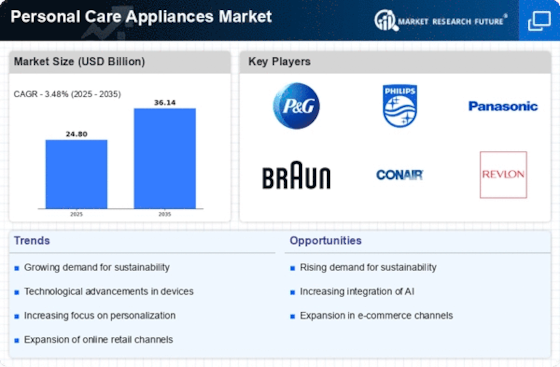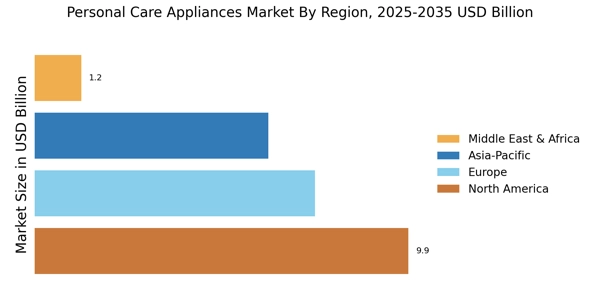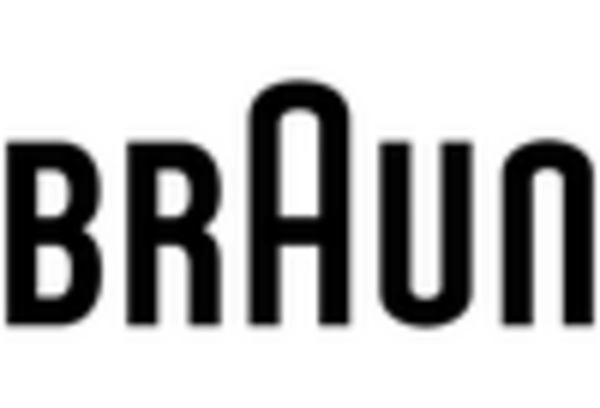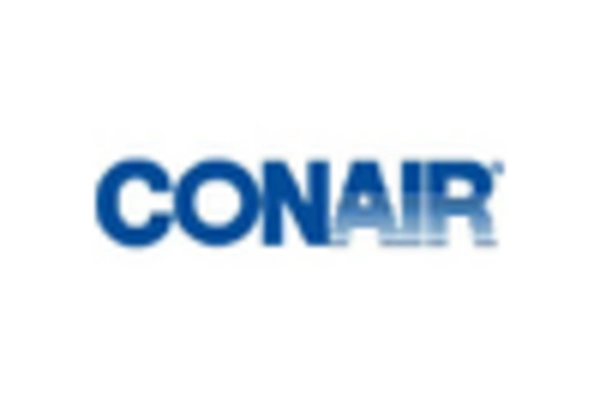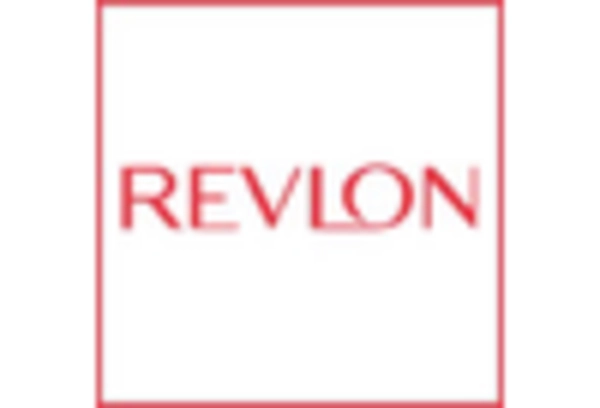Aging Population
The aging population is a demographic trend that significantly influences the Personal Care Appliances Market. As the global population ages, there is a growing demand for personal care appliances that cater to the specific needs of older adults. Products such as electric toothbrushes, hair clippers, and skincare devices designed for sensitive skin are becoming increasingly popular among this demographic. Data suggests that the segment of consumers aged 65 and older is expected to grow by over 20% in the next decade, indicating a substantial market opportunity. This trend highlights the necessity for manufacturers to develop products that not only meet the functional needs of older adults but also enhance their quality of life, thereby driving growth in the Personal Care Appliances Market.
Focus on Sustainability
The emphasis on sustainability is becoming a defining characteristic of the Personal Care Appliances Market. Consumers are increasingly seeking products that are environmentally friendly, prompting manufacturers to innovate in terms of materials and energy efficiency. For example, appliances that utilize recyclable materials or energy-efficient technologies are gaining traction among eco-conscious consumers. Market Research Future indicates that nearly 40% of consumers are willing to pay a premium for sustainable products, which suggests a significant opportunity for brands that prioritize eco-friendly practices. This focus on sustainability not only aligns with consumer values but also positions companies favorably in a competitive market, potentially leading to increased market share within the Personal Care Appliances Market.
Rising Consumer Awareness
The increasing awareness among consumers regarding personal grooming and hygiene is a pivotal driver for the Personal Care Appliances Market. As individuals become more conscious of their appearance and health, the demand for personal care appliances such as electric shavers, hair dryers, and skincare devices is likely to surge. Recent data indicates that the market for personal care appliances is projected to grow at a compound annual growth rate of approximately 7% over the next five years. This trend suggests that consumers are not only investing in these appliances for convenience but also for enhancing their overall well-being. The Personal Care Appliances Market is thus witnessing a shift towards products that promote self-care and personal grooming, reflecting a broader societal trend towards health and wellness.
Technological Advancements
Technological advancements play a crucial role in shaping the Personal Care Appliances Market. Innovations such as smart appliances, which integrate artificial intelligence and connectivity features, are becoming increasingly prevalent. These advancements allow for enhanced user experiences, such as personalized settings and real-time feedback. For instance, hair styling tools equipped with temperature control technology can prevent damage while optimizing styling results. The market is expected to see a significant increase in the adoption of such technologies, with estimates suggesting that smart personal care appliances could account for over 30% of total sales by 2026. This evolution indicates that consumers are seeking more efficient and effective solutions, driving the demand for technologically advanced personal care appliances.
Growing E-commerce Platforms
The proliferation of e-commerce platforms is transforming the landscape of the Personal Care Appliances Market. With the convenience of online shopping, consumers are increasingly turning to digital channels to purchase personal care appliances. This shift is supported by data showing that online sales of personal care products have risen by over 25% in the past year alone. E-commerce not only provides consumers with a wider selection of products but also facilitates price comparisons and access to customer reviews, enhancing informed purchasing decisions. As more consumers embrace online shopping, the Personal Care Appliances Market is likely to experience accelerated growth, with e-commerce becoming a dominant sales channel in the coming years.


